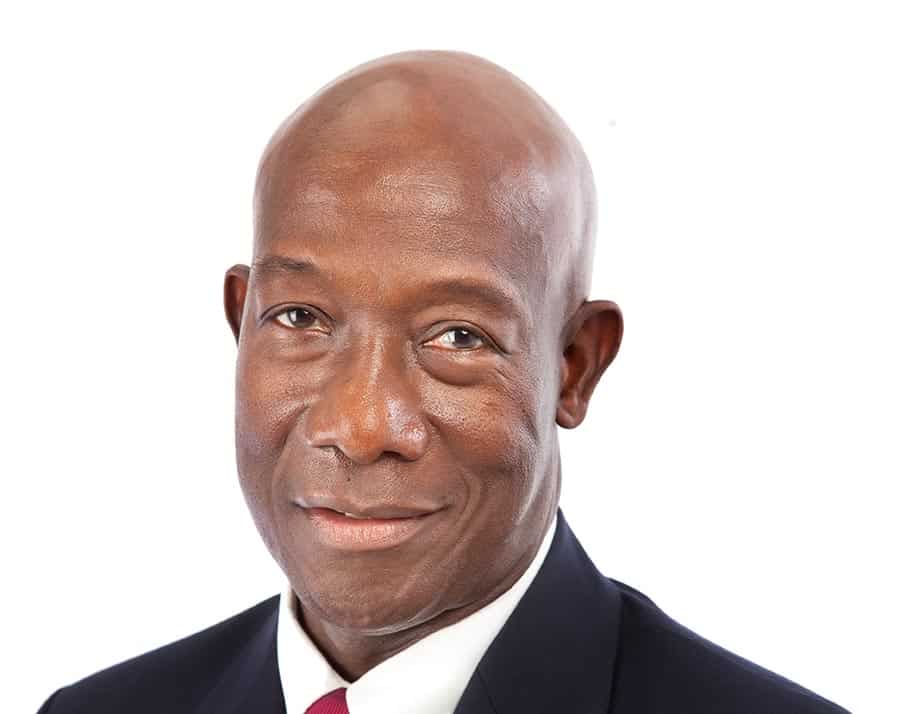
Above: Dr Keith Rowley. Photo by Mark Lyndersay
BitDepth#1270 for October 08, 2020
Dr Rowley, in your recent clarification – some might say rant – about the Government’s debt to TSTT, you made the point that to pay – or rather overpay – the state agency for the supply of surveillance equipment and services, you would be giving half of the money to C&W, the 49 per cent co-owner of the telecommunications company.
This seemed a surprising position to take, given the company’s inability to find an investor willing to take over the stake held by C&W, now properly a part of Liberty Global, the company that bought Cable and Wireless.
It’s unlikely that the company will ever find a buyer for that minority stake, a legacy of a very different business arrangement between the government and a major telecommunications company.
No serious player has come forward in all the long years that the shareholding has been up for sale, because they have no interest in buying into TSTT if they cannot have a deciding say in crafting an aggressive business position for the company. This competitive mess was foreseeable right from the start of the C&W acquisition of Columbus/Flow.
The company, as a result, finds itself sitting on a particularly uncomfortable fence, expected to generate returns like a business while, in every meaningful way, operating as an extension of the state’s interests.
TSTT’s unwillingness to utter a single word of rebuttal or defence of its business practices in the surveillance equipment deal and’ its submissive acceptance of a smear of scampishness in its dealings with the State makes its position clear in the pecking order of authority.
Instead of marshalling a legal and corporate communications response to an accusation by the country’s Prime Minister that it “overbilled” by $300 million, TSTT sat and kept its arse kwart, as fellow columnist Paolo Kernahan is given to say.
This note is meant to draw to your attention the consequences of putting the company in that position, which is antithetical to pursuing business success.
I also mention this because I worked briefly for Petrotrin, another state agency that also thought it was in business while existing functionally as an arm of government.
You had to shut that company down and replace it with Heritage Petroleum, so we both know where that road leads.
I mention this because as a customer of TSTT, I now see the same indicators of core business rot that I saw at Petrotrin, the appearance of significant productive activity, with little attention to measurable results.
A year ago, I had a conversation with former CTO Hassel Bacchus about problems with TSTT’s billing services.
The problem was to be solved by last Christmas. It was not.
Over the last two weeks, my cell service was cut twice for nonpayment despite verified payments. During this eventful time, I received two different monthly bills for my plan, which covers two numbers. Both billings listed the same phone numbers, one reporting a credit, the other with a debit.
Neither billing was correct, according to a first-tier customer service representative.
I try not to escalate personal matters like this, because once I do so, it means talking to people I report on and that’s always untidy, but it was clear that something was dramatically wrong.
It took a half-day to sort out at the executive level, and I am under no illusions that there was an emphasis on speed because of the line I’ve drawn between my personal experience with technology and the reporting I do that I’ve established in this space.
If it causes me pain and there is a likelihoood that others are experiencing the same, I’m going to write about it.
I have a powerful sense that this problem is far more widespread than my own personal experience and more troublingly, that there seems to be money sloshing around in TSTT that doesn’t automatically get attached to a customer’s account until an alarm is raised.
That isn’t the hallmark of a business ; it’s beginning to feel more like a bad civil service operation.
As a consequence, I invite you to think more clearly about the endgame with TSTT.
In the volatile environment of modern telecommunications, there is no room for uncertainty of purpose.
Either work out a purchase plan to buy TSTT from Liberty or cut the company free to be a business by releasing that critical two per cent and letting the company find a buyer that can design a sustainable future.
This is no way to run a telecommunications company.



